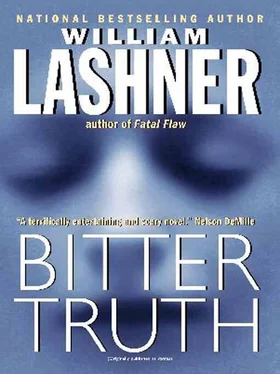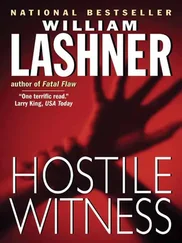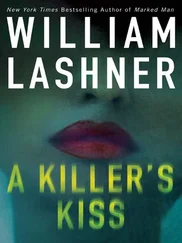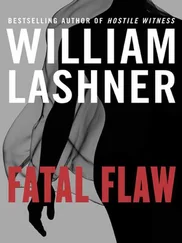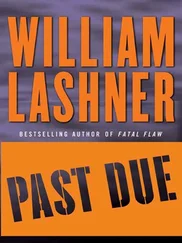When it was time I quietly left the quiet of my apartment, stepped down the stairs, looked both ways along the now dark street. Cautiously I slipped out onto the sidewalk. I passed my car and left it there. After what had happened in Raffaello’s Cadillac, and seeing what I had seen in the paper, I wanted nothing to do with cars for a while. I walked along Spruce, then down through the park at Nineteenth, and over to Walnut, to restaurant row. It was time, I figured, for me to do some fishing of my own.
“HOW’S THAT GROUPER, CAROLINE?”asked Franklin Harrington, with a surfeit of politeness.
Caroline was leaning back in her chair, arms crossed, moodily separating the pale flakes of fish with her fork. She wore her leather jacket and black jeans and combat boots and would have looked terribly out of place among the well heeled and well coifed except that Harrington, in his perfectly pressed Ralph Lauren, covered for her. “Succulent,” she said, her voice dry and devoid of enthusiasm.
“Terrific,” said Harrington, who had instinctively taken on the role of the host, either through the dictates of good breeding or his unbridled arrogance, I couldn’t yet figure. “And your crab cakes, Victor?”
“ Trayf, ” I said.
“I don’t understand.”
“It’s the Jewish word for succulent.”
“And I thought that was shiksa, ” said Caroline, with a sly smile, as she reached for her wineglass.
“ Trayf is broader than that.” I explained. “Not all trayf are shiksas, though shiksas are surely the most succulent trayf .”
“Well then why don’t you just go right ahead and order the shiksa, ” said Harrington.
Caroline spit out her mouthful of Chardonnay.
Welcome to the lifestyles of the rich and the Yiddish.
We were in the Striped Bass, a gaudy new restaurant on Walnut Street, more stage set than anything else, with palm tress and rattan chairs, with marble pillars three stories tall, with the kitchen open so the diners can see their fish’s firm flesh being pan-seared. It’s not enough to just eat anymore, restaurants are now theme parks. Ride the gingered seafood fritto misto. Thrill to the bite of clam fritters with Asian slaw. Test your courage with the raw Malpeque oysters and your manhood with the hunk of burning blackened sea bass. The Striped Bass served only seafood, that was the hook, but it was more show biz than anything else, no different than the Hard Rock Café and Planet Hollywood, though many steps up in class and price. Instead of hamburgers, mahimahi with arugula pesto. Instead of fajitas, sautéed Maine lobster with somen noodles. Instead of gawking teenagers, gawking adults, wondering who was rich enough or famous enough to be at the chef’s table that night. And despite this burden of atmosphere the food was actually brilliant. Reservations at the Striped Bass were taken months in advance, but guys like Harrington had their ways, I figured, and so there we were, Caroline sulking, Harrington as gratingly pleasant as a cruise director, and me, who had convened this awkward congregation, waiting for the appropriate moment to unload my questions.
I hadn’t liked Harrington when we first met at the bank and I still didn’t like him. There was an air of false importance about him, a sense that what he said actually mattered. He had been somebody’s blue-eyed boy for too long. He needed to be stepped down a peg and I was just the guy, I figured, to do the stepping. I wanted to be sure, by the end of the night, after all was said and done, that he knew I had screwed his fiancée, and even though I hadn’t liked it much, he didn’t need to know that. Class divisions as clear as those between Harrington and myself always bring out my best, or at least my most petty.
I took a forkful of crab, swirled it in the mustard sauce, and swallowed. It was too good. Harrington was working on his swordfish. Caroline was still flaking her grouper with the tines of her fork, showing no inclination to eat despite the thirty bucks her fish cost. It was almost getting beyond awkward, so I thought I’d lob in the first of my little bombs and liven things up.
“Who,” I asked nonchalantly as I picked at my crab, “was Elisha Poole?”
Harrington looked up from his plate with a sharp surprise on his face. He glanced at Caroline, who rolled her eyes with boredom, and then back at me. “What do you know about Poole?”
“Bobby told me a little when I was at the house the other night.”
“Yes,” said Harrington, his pale cheeks darkening, “I heard you were there.”
I smiled a competitive little smile. One of the evening’s goals, at least, had been scored. “Bobby told me that his great-grandfather had bought the company from Poole just before he started pushing his pressure-packed pickles and that, later, Poole claimed he was swindled. Bobby said that Poole had cursed the whole family for it.”
“So that explains everything,” said Caroline. “I rather like the idea that we are cursed. It’s more comforting than knowing we screwed it up ourselves.”
“Everything Bobby told you is correct,” said Harrington. “It was Poole ’s company before Claudius Reddman bought it, one of a score on the docks canning produce. Poole was a tinsmith and started the company by tinning tomatoes and corn brought over from New Jersey. Claudius was first hired as an apprentice tinsmith but soon took on other responsibilities.”
“When did you learn all this, Franklin?” asked Caroline.
“I find it prudent to study the history of any family whose wealth I administer.”
“How did Reddman end up buying the company if he was just an apprentice tinsmith?” I asked.
“We’re not sure,” said Harrington, “but it appears that Poole liked his drink and as Claudius was able to handle more and more of the business side of things, Poole spent more time with a bottle. Poole ’s father was a notorious drunk, apparently, and so it was only a matter of time before it caught up with the son.”
“Can you get us more wine, Frankie,” said Caroline. “I’m suddenly thirsty.”
I gave Caroline a glance as Harrington snapped for a waiter and ordered another bottle.
“As Poole ’s drinking grew worse,” said Harrington, “Reddman started taking control of the company. Bit by bit he purchased Poole ’s stock, paying cash for the shares. The company wasn’t earning much in those days and Poole was finding himself falling into debt and so he took the money eagerly.”
“Where did the cash come from?” I asked.
Harrington shrugged. “There’s the mystery. But just before the company expanded production of its soon to be famous pickles, Reddman took out a loan to buy the rest of Poole ’s shares. By that time the company was in the red and Poole was apparently only too ready to sell out. It was quite the gamble for Claudius Reddman, taking a loan to buy a profitless company.”
“But it paid off, didn’t it?” I said. “Reddman became a wealthy man, an American industrial giant, and Poole was left to hang himself.”
“That’s right,” said Harrington, turning his attention back to his fish. “ Poole ended as an embittered old drunk who had pissed away his chance for a fortune, that’s one way to view him. Or, if you take his side, he was an honest, trusting man, swindled by an avaricious swine who built his own fortune off the carcass of Poole ’s life work.”
“Who is left to take his side now?” I asked.
“Pardon?”
“Who is around who still thinks Poole was swindled?”
“I don’t know,” said Harrington. “The Pooles, I suppose.”
“Are there any?”
The sommelier came with another bottle of wine, red this time, and poured a sip’s worth into Harrington’s glass. Harrington tasted it and nodded at the waiter and then said offhandedly, “I would think there are.”
Читать дальше
